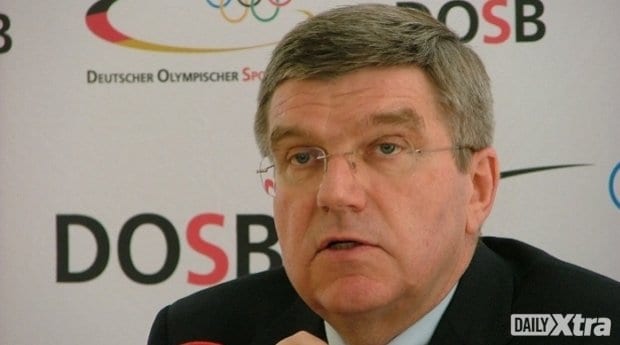The International Olympic Committee (IOC) has voted unanimously to add sexual orientation as a protected category to Principle 6 of the Olympic Charter.
It’s an amendment that LGBT activists and allies fervently lobbied the sports governing body to make after Russia’s enactment of anti-gay laws in the leadup to the 2014 Sochi Winter Games. An IOC media representative confirms the amendment was approved on Dec 8 and says the exact change in the text will be published in the coming days once the organization’s legal team has worked on the language of the recommendation.
Gender identity has not been included as part of the amendment.
The proposal to add sexual orientation is among 40 recommendations that were scheduled to be discussed at the 127th IOC Session in Monaco on Dec 8 and 9. Part of the Olympic governing body’s Agenda 2020, the goal of the sessions is to shape the future of the Olympics.
“The new wording of the sixth Fundamental Principle of Olympism is derived from the United Nations Universal Declaration of Human Rights,” IOC president Thomas Bach said in his address at the Dec 7 opening ceremony of the sporting body’s Extraordinary Session. “In one point it will now be even more clear because it includes also sexual orientation. This strengthened wording will help us to ensure the respect for all these rights for all participants during the Olympic Games.”
In September, the IOC also committed to adding anti-discrimination language to host-city contracts.
French LGBT activist Marc Naimark says he is “really pleased” with the outcome of the vote. “Once it was announced that this was planned, it was pretty certain that it was going to take place.” He says the IOC is a “very controlled” organization, adding it would not have proposed the change if it weren’t a fait accompli.
What remains to be seen is how the amendment will be implemented and how organizations will address it, Naimark notes.
Vancouver Councillor Tim Stevenson hailed the Dec 8 vote as “magnificent,” saying the adoption of the amendment doesn’t surprise him at all. “I would have been shocked if [the IOC] had not been able to. Obviously, [Bach] was not moving forward just crossing his fingers; he had done his homework and was prepared to put his position on the line.”
Stevenson led a Vancouver delegation to Russia in February to lobby the IOC for protection for gay athletes. “It’s wonderful for LGBT athletes in the future,” Stevenson says now.
“Young people who are now only maybe 10 or 11 will not realize the struggle it was for us and will find that they are in an organization that has this non-discriminatory [language] included,” he says, adding it has been critical for LGBT people to have protections and their rights embedded in law. “After that, once you have the assurance that it’s in law — or in the charter in this case — then you go forward from there and change hearts and minds.”
Shawn Gaylord, advocacy counsel on LGBT rights for the US organization Human Rights First, also hails the change as an important one. He says his concern has always been that if sexual orientation and gender identity aren’t spelled out, countries that don’t have interest in, or a history of, protecting sexual- or gender-identity minorities will not read Principle 6 as including them.
While the amendment is a good first step, it’s not inclusive of gender identity, he notes. “Ultimately, we really want to see that happen as well and really don’t see any reason why it could not.”
Naimark says the fact that gender identity is not part of the amendment is secondary for the moment. “Let’s see how they do with sexual orientation,” he says. “I think there is sufficient overlap that there is no question about gender identity; it’s going to be dealt with by the way the charter is written today. I think it’s kind of understood.”
Sport is an important nexus of issues related to sex and gender, and there aren’t easy solutions, especially in an environment that is very conservative, Naimark says, adding that the importance of the change shouldn’t be downplayed. “For me, the priority is the implementation and how this general principle is actually understood and applied.”
With concerns being raised about what effect, if any, the new amendment will have on the ground in countries where homosexuality is criminalized and athletes cannot come out, one possible litmus test of the IOC’s willingness to apply the change may come in the context of the 2022 Winter Games bid by Kazakhstan, a former Soviet republic, which is considering the adoption of anti-gay legislation similar to Russia’s. China is the only other country that has left its bid for those Games on the table after Norway, Sweden, Germany, Poland and Switzerland all killed bids to host the event because of the steep costs and voter opposition.
Gaylord says the timing of the change to Principle 6 is welcome, since the decision about the 2022 Games will be made a few months from now. “If Kazakhstan is interested in playing this role on the international stage, or China, I would imagine they paid attention to what just happened,” he adds. “As advocates, we need to be really clear about what our understanding is of what this change means and what they need to do, and refrain from doing in the case of Kazakhstan, where it seems there are some things in the pipeline.”
Naimark says the only way the changes in the charter and host-city contracts will be meaningful is if there is a choice among bidders.


 Why you can trust Xtra
Why you can trust Xtra


